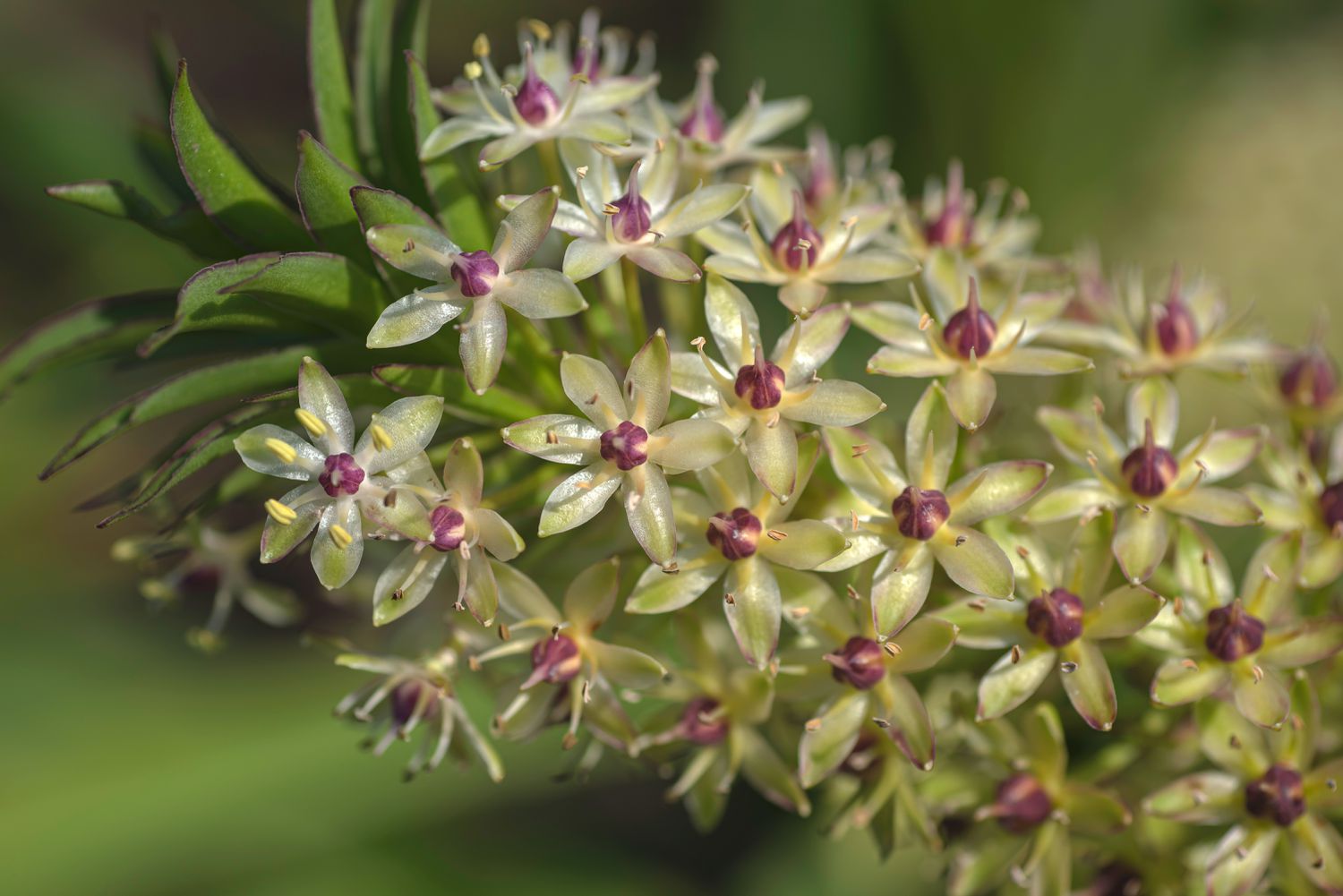
The Pineapple Lily, scientifically known as Eucomis, is a fascinating plant that often surprises people with its unique characteristics and beauty. This tropical flower gets its name from its distinctive pineapple-like shape when the flowers are in full bloom. Native to South Africa, Pineapple Lily has gained popularity among garden enthusiasts for its striking appearance and easy cultivation.
In this article, we will uncover 18 surprising facts about the Pineapple Lily that will surely expand your knowledge and admiration for this remarkable plant. From its origin and appearance to its cultivation requirements and medicinal uses, there is much to discover about this captivating flower. So, let’s delve into the world of Pineapple Lily and unravel the secrets hidden within its vibrant blooms.
Key Takeaways:
- Pineapple Lily, also known as Eucomis, is a stunning tropical plant with vibrant blooms and a pineapple-like appearance. It’s low-maintenance, deer-resistant, and attracts pollinators, making it a perfect addition to any garden.
- With over 50 different species and a variety of flower colors, Pineapple Lily is a versatile and eye-catching plant. It can be grown outdoors, in containers, or even as a unique indoor houseplant, adding tropical charm to any space.
Pineapple Lily, also known as Eucomis, is a tropical plant native to South Africa.
This unique flowering plant belongs to the Asparagaceae family and is known for its stunning blooms and unusual pineapple-like appearance.
The name “Pineapple Lily” comes from its resemblance to a pineapple fruit.
The thick, fleshy flower spikes of the Pineapple Lily closely resemble the shape and texture of a pineapple, hence its common name.
There are over 50 different species of Pineapple Lily.
Eucomis is a diverse genus, with a wide range of species that vary in size, color, and shape of their flower spikes.
Pineapple Lily flowers come in a variety of colors.
From shades of white, cream, yellow, pink, and purple, the flowers of Pineapple Lily add vibrant pops of color to garden landscapes.
Pineapple Lily is a popular choice for cut flower arrangements.
The striking appearance and long-lasting blooms of Pineapple Lily make it a favorite among florists for creating unique and eye-catching floral designs.
Pineapple Lily blooms during the summer months.
These perennials typically bloom from late spring to early autumn, depending on the specific species and growing conditions.
The flowers of Pineapple Lily emit a pleasant fragrance.
When in full bloom, Pineapple Lily flowers release a sweet, tropical scent that attracts butterflies and other pollinators.
Pineapple Lily is a low-maintenance plant.
Once established, Pineapple Lily requires minimal care, making it an ideal choice for gardeners looking for hassle-free plants.
Pineapple Lily prefers well-draining soil and full sun to partial shade.
These plants thrive in areas with good drainage and benefit from sunlight exposure for at least a few hours each day.
Pineapple Lily is deer-resistant.
Due to its unpalatable foliage, Pineapple Lily is generally not attractive to deer and other browsing animals.
Pineapple Lily can be propagated through bulb division.
If you wish to expand your Pineapple Lily collection, simply divide the bulbs in early spring or after the blooming season.
The bulbs of Pineapple Lily can be left in the ground year-round in warmer climates.
In frost-free regions, Pineapple Lily bulbs can be left in the ground, where they will continue to multiply and produce beautiful blooms year after year.
Pineapple Lily is drought-tolerant.
Once established, Pineapple Lily has the ability to withstand periods of drought, making it a resilient choice for arid or water-restricted gardens.
Pineapple Lily is not frost-tolerant.
In colder climates, where temperatures drop below freezing, Pineapple Lily bulbs should be dug up and stored indoors during the winter months.
The leaves of Pineapple Lily have an attractive spotted pattern.
The broad, strap-like leaves of Pineapple Lily are adorned with unique spots or speckles, adding visual interest to the plant even when not in bloom.
Pineapple Lily can be grown in containers.
For those with limited garden space, Pineapple Lily can thrive in containers, making it a versatile plant choice for patios, balconies, and small gardens.
Pineapple Lily attracts pollinators to the garden.
The vibrant blooms and sweet fragrance of Pineapple Lily serve as magnets for bees, butterflies, and other beneficial insects, promoting a healthy ecosystem in the garden.
Pineapple Lily can be grown as a unique indoor plant.
With proper care and ample sunlight exposure, Pineapple Lily can be grown as a captivating houseplant, adding a touch of tropical charm to your interior space.
In conclusion, the 18 Surprising Facts About Pineapple Lily showcase the beauty and versatility of this remarkable plant. From its pineapple-like appearance to its wide array of colors, Pineapple Lily is a stunning addition to any garden or floral arrangement. Whether grown outdoors or indoors, the unique characteristics and low-maintenance nature of Pineapple Lily make it a popular choice among both novice and experienced gardeners. So, why not plant some Pineapple Lilies in your garden and enjoy the captivating beauty they bring?
Conclusion
In conclusion, Pineapple Lily, also known as Eucomis, is a fascinating plant that deserves more recognition. Its unique characteristics, such as its pineapple-like shape and stunning flowers, make it a popular choice among gardeners and plant enthusiasts. From its origin in Southern Africa to its ability to thrive in various climates, the Pineapple Lily is truly a versatile and resilient plant.
Whether you are looking to add a touch of tropical flair to your garden or simply want to expand your plant collection, consider adding the Pineapple Lily to your list of must-have plants. With its beauty, ease of care, and surprising facts, the Pineapple Lily is sure to delight and captivate anyone who encounters it.
FAQs
Q: Are Pineapple Lilies easy to grow?
A: Yes, Pineapple Lilies are generally easy to grow. They prefer well-drained soil and partial shade but can tolerate full sun in cooler climates. As long as you meet their basic care requirements, such as regular watering and occasional fertilizing, Pineapple Lilies can thrive in your garden.
Q: What is the best time to plant Pineapple Lilies?
A: The best time to plant Pineapple Lilies is in the spring or early summer, after the danger of frost has passed. This will give the plants enough time to establish their root systems before the colder months arrive.
Q: How tall do Pineapple Lilies grow?
A: Pineapple Lilies can grow to be around 12 to 24 inches tall, depending on the variety. The flower spikes can add an additional height of 12 to 18 inches, making them an eye-catching addition to your garden.
Q: Are Pineapple Lilies invasive?
A: No, Pineapple Lilies are not considered invasive. They have a clumping growth habit and do not spread aggressively. However, it’s always a good idea to monitor their growth and prevent them from overcrowding other plants.
Q: Can I grow Pineapple Lilies indoors?
A: Yes, you can grow Pineapple Lilies indoors as long as you provide them with adequate light, well-draining soil, and proper care. They can be an excellent addition to indoor gardens or as potted plants, adding a unique touch of beauty to your home.
Was this page helpful?
Our commitment to delivering trustworthy and engaging content is at the heart of what we do. Each fact on our site is contributed by real users like you, bringing a wealth of diverse insights and information. To ensure the highest standards of accuracy and reliability, our dedicated editors meticulously review each submission. This process guarantees that the facts we share are not only fascinating but also credible. Trust in our commitment to quality and authenticity as you explore and learn with us.


